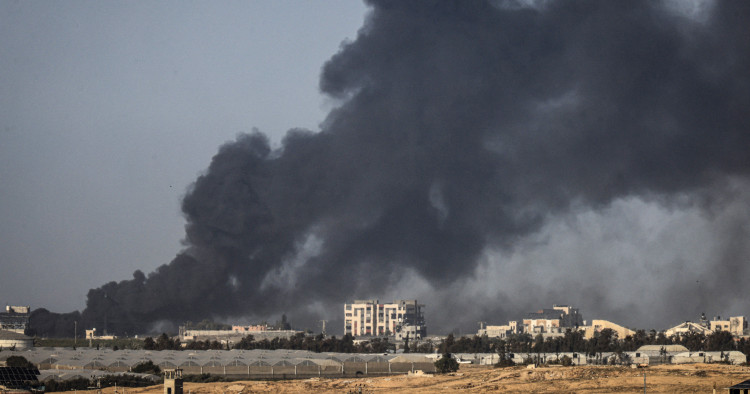Contents:
- Growing dissension in Israel as Netanyahu hopes to keep the war going
- The uncertain impact of Middle East policy on US politics in the 2024 elections
- In search of pressure points on the Houthis, the Biden administration turns to terrorist designations
- Iran lashes out all around as its diplomats remain sidelined
- Pakistan and Iran stop short of a full-blown crisis
- Local elections will make or break Turkish opposition, dictate Erdoğan’s ability to shape his legacy
Growing dissension in Israel as Netanyahu hopes to keep the war going
Paul Scham
Non-Resident Scholar

-
Israelis know and are increasingly angry that Prime Minister Benjamin Netanyahu is strongly incentivized to keep this war — or any war — going as long as possible, and so he is becoming ever more reliant on maintaining support from his far-right coalition partners.
-
Though support for the war remains widespread, Israeli society is splitting along left-right lines into those who see bringing home the hostages as its primary aim, including some senior army commanders, versus those who still believe that Hamas can be destroyed.
On Friday morning, Jan. 19, several international radio stations, including the BBC, reported with apparent surprise that, in his Thursday night press conference, Israeli Prime Minister Benjamin Netanyahu had ruled out the establishment of a Palestinian state after the war in Gaza. As recounted by the Times of Israel, “ ‘[I]n any future arrangement, or in the absence of an arrangement,’ he [Netanyahu] said, Israel must maintain ‘security control’ of all territory west of the Jordan River — meaning, Israel, the West Bank and Gaza.” As Israelis were not surprised. The proclamation was a predictable, unvarnished, negative response to President Joe Biden and Secretary of State Antony Blinken restating the US commitment to a Palestinian state and ruling out Israeli control of Gaza after the war. Over the weekend, Biden reiterated his position that Israel must withdraw after the war — and Netanyahu again insisted it would not, while steadfastly refusing any “day after” plan or discussions. Given his coalition’s composition, he cannot even consider allowing a Palestinian state.
In the weeks before the war began on Oct. 7, as Israel and Saudi Arabia were apparently getting close to normalizing their relationship, the expectation was only that, as part of this extension of the Abraham Accords, the Palestinians might receive some “minor concessions” and “lip service” toward a two-state solution, but would likely “find themselves with even less leverage and fewer options than before.” That was then. Now, there is general agreement among Western and Arab governments that the only way to stabilize the Israeli-Palestinian relationship is with genuine movement on a credible track toward two states. However, although a recent representative poll indicates Netanyahu’s popularity among Israelis is around 15%, their support for a two-state solution is only slightly higher, 25%. Netanyahu’s boast is that only he can prevent the creation of an independent Palestinian state.
Israelis know and are increasingly angry that Netanyahu is strongly incentivized to keep this war — or any war — going as long as possible, since when it is over, new elections may be impossible to avoid, in which he will likely lose his post as prime minister and thus be liable to be sent to jail if found guilty in his interminable trial for fraud. Gadi Eisenkot, an ex-Israel Defense Forces (IDF) chief of staff and an opposition member of the war cabinet, stated at a news conference immediately after Netanyahu’s that the goal of destroying Hamas was now unreachable and called for new elections. Bibi’s only chance of staying in office if Eisenkot’s (and Benny Gantz’s) party, National Unity, leaves the war cabinet is to hew to the demands of his far-right coalition partners, Itamar Ben-Gvir and Bezalel Smotrich, whose unconcealed aims are to empty Gaza of Palestinians and annex the West Bank. A ruinous war with Hezbollah is increasingly seen as inevitable by the right, which would also serve to keep Netanyahu in office. Recent Israeli assassinations of senior Hezbollah officials in Lebanon may be goading it to attack, though, so far, its longtime leader, Hassan Nasrallah, is avoiding taking the bait.
Increasingly, though support for the war remains widespread, Israeli society is splitting into those who see bringing home the hostages as its primary aim, including some senior army commanders, versus those who still believe that Hamas can be destroyed. That is largely a left-right split. While it is generally agreed that the war has moved Israelis to the right, 60% of Israelis now want to see a pause in the fighting in return for a release of hostages. Given Netanyahu’s manifest unpopularity, if Gantz and Eisenkot leave the war cabinet and call for an emphasis on freeing the hostages rather than destroying Hamas, a goal increasingly seen as unreachable, Israel might be plunged into another wrenching internal struggle as it was before Oct. 7, but this one playing out in the midst of a brutal war.
A report in the Wall Street Journal Monday morning, taken seriously by Ha’aretz’s military reporter, Amos Harel, stated that Israel and Hamas are in negotiations on a plan that would free the hostages in return for thousands of Palestinian prisoners Israel holds, and also involve a 90-day ceasefire, with the intention of that ending the Hamas-Israel war. Meanwhile, again according to Ha’aretz on Monday, Ben-Gvir told his supporters that “if it’s decided to stop the war, I will not be a part of this government.” Clearly setting up a confrontation, the Labor Party announced half an hour later that it would submit a no-confidence motion to bring down the government, citing the “failure in its policy and duty to return the hostages.”
The uncertain impact of Middle East policy on US politics in the 2024 elections
Brian Katulis
Vice President of Policy

-
Strident voices in elite political circles advocating for different US Middle East policy approaches may be overestimating how much these issues matter to ordinary American voters.
-
More than nine months is a long time in the country’s electoral calendar, and many other issues, including ones closer to home, will impact results, in addition to foreign policy.
The war between Israel and Hamas, along with wider concerns about conflict and instability in the Middle East, has raised some questions about whether the region will feature prominently in deciding who wins the US presidency and seats in Congress in the November elections.
Some have raised the prospect that discontent among the Arab-American community with Joe Biden’s approach to the war in Gaza might undercut his chance for re-election in 2024. Last week, a journalist asked Biden directly if he was concerned that many Arab-American voters have said they will not vote for him later this year. President Biden responded, saying, “…the former President wants to put a ban on Arabs coming into the country. We’ll make sure he — we understand who cares about the Arab population, number one.”
Biden’s response pointed to what seems increasingly likely in 2024 — a re-run of the 2020 election that pitted him against Donald Trump. While other candidates are still running, it seems increasingly likely that America is looking at a Trump-Biden rematch. On Middle East policy questions, including the Israeli-Palestinian conflict, it is unclear how these two candidates might position themselves in the current debate. Trump’s signature policy outcome in the Middle East was the 2020 Abraham Accords, which normalized relations between Israel and several Arab countries, but his approach to the Palestinian issue, including his 2020 proposed peace plan, was crafted without significant or meaningful input from Palestinians.
Large public protests in major American cities over the past few months against Biden’s approach reflect a level of strong public disagreement with the administration, but it remains to be seen if this discontent will translate into something that shapes electoral outcomes at the presidential level, particularly as voters focus on the likely candidate contrast and the stakes.
Even in elite political circles most focused on Middle East policy questions in places like Congress, it is hard to point to significant shifts in how both Republicans and Democrats vote on key policy issues related to the Israeli-Palestinian question. For sure, the debate has shifted, with a wider range of diverse voices raising criticisms of the status quo approach and offering alternatives. But more than 100 days into the war, it is not yet clear whether these viewpoints have coalesced in a clear way.
As a case in point, just last week, the US Senate voted down a proposal by Senator Bernie Sanders to condition US aid to Israel on whether Israel is violating human rights in Gaza — the measure failed, with 72 against and 11 for. This vote margin calls to mind a different vote in the fall of 2021, after the previous Gaza war between Israel and Hamas, when the US House of Representatives voted 420-9 in favor of funding Israel’s Iron Dome missile defense system. The current holdup in providing Israel with supplemental funding that Biden proposed in October is more related to the fact that this proposal is part of an overall package aimed at border security and aid to Ukraine as well as Taiwan, and less about some new coalition that has formed to shift US policy in the Middle East in a significantly new direction.
The Gaza war, Russia’s war against Ukraine, and ongoing concerns regarding China have placed foreign policy questions more at the forefront in 2024 than they have been in recent elections. But the current political debate is still nowhere close to where it was in 2006-2008, when the Iraq war topped the priorities of many voters. The center of gravity in America’s political debate remains at home, with the economy and immigration registering as leading concerns among ordinary voters at the start of the year.
More than three months of war and increased turmoil in the Middle East have not fundamentally shifted the overall frame for America’s political debates as the country heads toward the 2024 elections. But with so much uncertainty in the region and the wider world as well as increased unpredictability in American politics, many things could change between now and November.
Follow on Twitter: @Katulis
In search of pressure points on the Houthis, the Biden administration turns to terrorist designations
Gerald M. Feierstein
Distinguished Sr. Fellow on U.S. Diplomacy; Director, Arabian Peninsula Affairs

-
The Houthis’ capacity to sustain their campaign of targeting shipping in the Red Sea is unlikely to be significantly degraded as a result of the limited US airstrikes.
-
With few options remaining, the administration has now returned to the issue of designating the Houthis as a terrorist organization, leaving offramps available; but the Houthis are unlikely to respond positively to the latest administration effort, meaning that the only solution is an end to the war in Gaza.
The Biden administration is grappling with a dilemma as it seeks to balance its three competing, if not mutually exclusive, priorities in its dealings with the Houthis. To succeed, the administration must:
- Protect commercial shipping passing through the Bab al-Mandeb and the Red Sea, en route to or from the Suez Canal;
- Prevent the Israel-Hamas conflict in Gaza from igniting a regional conflict; and
- Avoid undermining efforts to end the nearly decade-old Yemen civil war.
To further complicate matters, the Houthis, while likely not seeking to escalate their confrontation with the United States and its allies, nevertheless see political benefit in sustaining their battle with the US and, by extension, with Israel.
As Houthi attacks on shipping in the Red Sea have incurred increasing damage to international shipping and the global economy, the administration has employed the political, diplomatic, and military tools at its disposal. Initially seeking to message the Houthis through established diplomatic channels, the administration attempted unsuccessfully to convince the Houthis to stand down in their attacks. Failing that, the administration turned to military pressure, albeit with low expectations that the effort would achieve a meaningful result. While undoubtedly successful in identifying and destroying Houthi targets, the reality is that the Houthi capacity to sustain its campaign, and to repair or replace weapons and facilities targeted by the US, is unlikely to be significantly degraded as a result of the limited US airstrikes. Indeed, even without actually taking action against ships in the Red Sea, the threat alone of Houthi attacks on shipping is likely sufficient to deter nervous shipping companies from returning to the Red Sea maritime routes.
With few options remaining, the administration has now returned to the issue of designating the Houthis as a terrorist organization, but with measures built in that are aimed at limiting the damage that would result from a full Foreign Terrorist Organization (FTO) designation and including offramps that could incentivize the Houthis if they were to choose to avoid further confrontation. These include delaying the trigger of the designation as a Specially Designated Terrorist Group (SDTG) for 30 days, providing flexibility for continued humanitarian assistance and commercial trade, and making clear that the designation could be reversed should the Houthis halt their Red Sea attacks. Nevertheless, the Houthi reaction to the announcement makes clear that the Houthis are unlikely to respond positively to the latest administration effort.
Should the combination of limited military action and terrorist designations fail, the administration’s dilemma will increase. Confronting domestic pressure to intensify its response to the Houthi attacks while seeking to preserve its conflicting policy objectives, the administration could expand its military campaign in Yemen, without much prospect that it would yield a different result. Alternatively, it could seek to pressure Iran to stop its support for the Houthi effort, which would be a high-risk strategy if preventing the spread of the conflict remains a priority. In sum, the best option for securing shipping in the Red Sea would be an end to the conflict in Gaza.
Iran lashes out all around as its diplomats remain sidelined
Alex Vatanka
Director of Iran Program and Senior Fellow, Black Sea Program

-
Iran’s recent decision to launch attacks in three different countries (Pakistan, Iraq, and Syria) in quick succession had varying motives but was mostly about showing muscle and hoping to deter opponents.
-
Meanwhile, Tehran’s missile strikes inside of Pakistan have become a source of debate among Iranians about the overbearing influence of the IRGC in foreign relations, as Iranian diplomats remain sidelined.
The recent escalation in tensions between Iran and Pakistan will not lead to any larger military conflict. Neither Iran nor Pakistan has an interest in such a development. Tehran is already entangled in various fights in the Arab world — from Gaza to Yemen and from Iraq to Lebanon. Whereas Islamabad’s strategic focus remains on India. That said, if unchecked, the latest Iranian-Pakistani spat could result in an increase in destructive zero-sum regional competition. Meanwhile, for the Iranians, this a fork-in-the-road moment should Tehran want to reassess its regional priorities.
Iran’s recent decision to launch attacks in three different countries (Pakistan, Iraq, and Syria) in quick succession had varying motives. After the Kerman twin terrorist attacks on Jan. 3, Tehran had no choice but to act and do so fast, given the magnitude of the civilian death toll. For Iran, the symbolic value of its retaliatory strikes was more important than making sure the targets hit were actually responsible for the Kerman bombing.
Since ISIS and Jaish al-Adl (an Iranian ethnic Baluch militant group) had, respectively, taken responsibility for Kerman and a separate attack in Jask in December, Tehran opted to respond by purportedly hitting the former in Syria and the latter inside Pakistan. The attack against Erbil, in the Kurdistan Region of Iraq, on the other hand, was necessitated by the fact that Iranian officials had, at the outset, accused the Israelis of involvement in the Kerman attack. Claiming to have hit an alleged Mossad asset in Erbil gives the regime in Tehran grounds to assert it has now retaliated against Israel.
Even if Iran did, in fact, hit a Mossad base of operation, retaliation against Israeli assets in Iraq is not the same thing as retaliating directly against Israel itself. In other words, all three of these above-mentioned missile strikes were mostly about Iran showing muscle and hoping they will deter its opponents in the future from attacking the country. Tehran has carried out similar attacks both in Syria and in Iraq before, mostly because it feels it can get away with it. But to attack Israeli territory directly, even in retaliation, is not something Iran will do as this would bring the United States into the war.
Of the three above incidents, the attack inside Pakistan generated the most media interest. Indeed, it was unusual, in part, for the distance of the target from the border, but Iran has in the last few decades occasionally targeted anti-Iran militants based inside of Pakistan. Islamabad’s expression of anger, including retaliatory strikes on Iranian soil, was understandable. Yet going forward, Pakistan will do as it has done in the past: ask Iran to respect its territory but then hope the episode can be closed and for both parties to move on.
Reportedly, Iran’s Foreign Minister Hossein Amir-Abdollahian will soon visit Islamabad, an act that Pakistan will claim as an Iranian admission of wrong-doing and repentance. Still, a basic hard reality persists: After years of promises of security cooperation, Iran and Pakistan are still badly divided on the issue of combatting militants who operate in the Iranian-Pakistani cross-border regions. The historic deep mistrust that has existed between the two states since Iran’s Islamists took over in 1979 remains in place. In a worst-case scenario, Tehran and Islamabad could revive the nasty competition for power via proxies that they engaged in in the 1990s in Afghanistan.
Meanwhile, Tehran’s missile strikes inside of Pakistan have become a source of debate among Iranians, with one prominent commentator asking why Iran is so quick to resort to violence and not diplomacy when it comes to resolving its differences with foreign opponents. Many in Iran ascribe this to the prominence of the Islamic Revolutionary Guard Corps (IRGC), which has far more policy influence inside Iran than its diplomats. As Heshmatollah Falahat-Pisheh, a former senior member of the Majlis (Iranian legislature), put it, “The reason [for tensions with the outside world] is that diplomats are marginalized in Iran.”
Plenty of pro-regime supporters still believe that the best way to defend Iran is by showing strength. Media close to the IRGC claim that the “Israelis got the message [when Iran fired missiles into three countries].” The problem, however, is obvious: Israel is not deterred. Most recently, Israel killed five more IRGC officers in an airstrike on Damascus on Jan. 20.
Follow on Twitter: @AlexVatanka
Pakistan and Iran stop short of a full-blown crisis
Marvin G. Weinbaum
Director, Afghanistan and Pakistan Studies

-
Last week, Iran and Pakistan exchanged tit-for-tat airstrikes targeting ethnic-Baloch insurgent groups, resulting in stern warnings and a halt in diplomatic ties.
-
While neither country can afford a conflict right now, the brief clash highlights their mutual distrust over key security concerns and the root causes of their grievances remain unchanged.
Ethnic and sectarian issues have often been a thorn in relations between Pakistan and Iran.
Most seriously, Pakistan has accused Iran of harboring separatists and facilitating Indian spies inciting insurgency among Pakistan’s ethnic Baloch. In a near mirror image, Iran has blamed Pakistan for not undertaking meaningful action against Iranian Baluch separatists encamped on Pakistan’s soil. Last week’s exchange of airstrikes on Pakistan’s and Iran’s respective sheltered insurgent groups seemed for a time liable to escalate into a full-blown crisis and possible extension of the turbulence in the Middle East.
The twin cross-border attacks were aimed at militant training camps. Iran struck the Pakistani-based Iranian ethnic insurgent group Jaish al-Adl that, a month earlier, had raided a police station in Iran’s majority-Baloch Sistan and Baluchestan Province, taking the lives of 11 officers. The Jan. 16 airstrike in Pakistan’s Balochistan Province was claimed to have killed at least two children. Pakistan’s retaliation, coming less than 24 hours later, targeted the Balochistan Liberation Army and the Balochistan Liberation Front militants operating from Iran. Reportedly nine died, seven of whom were women and children, family members of the insurgents.
For violating its airspace, Pakistan denounced the attack as an “unprovoked violation of sovereignty.” It issued a stern warning to Iran and paused diplomatic ties, withdrawing its ambassador to Tehran and barring the Iranian ambassador from Islamabad. For its part, Iran condemned Pakistan’s launching of planes and drones on seven locations inside Iran and called the attacks “unbalanced.” Raising the issue of territorial integrity as a “redline,” Iran conducted an impressive air defense drill to demonstrate its capacity to intercept hostile aircraft. Yet, despite the signs of escalation, Pakistan and Iran provided themselves an off-ramp. While harshly criticizing the other, both held out olive branches by similarly expressing the desire for “brotherly” relations. There soon followed an agreement on the need to address future counter-terrorism activities, and diplomatic ties have been restored. Both ambassadors are set to return on Jan. 26, and the Iranian foreign minister will visit Islamabad shortly thereafter.
The brief clash between the two countries nevertheless highlights their distrust over key security concerns, and a willingness to deviate from their previous hesitance to unilaterally attack each other's territory. But Pakistan and Iran are likely to exercise restraint in their policies toward one another moving forward. With Iran deeply engrossed in several Middle East crises and Pakistan trying to cope with political turmoil and a major economic crisis, neither country can afford a drawn-out conflict. Pakistan must also consider that a hostile Iran has the means to revive barely contained sectarian discord between Pakistan’s Sunni majority and Shi’a minority. Only last week, Pakistan’s security forces cracked down on an Iranian-backed sectarian militant network operating within the country as a way of countering Iranian influence. Although tensions between Iran and Pakistan over their Baloch troubles may have eased for now, many of the root causes of their grievances remain unchanged.
Research assistant Naad-e-Ali Sulehria contributed to this piece.
Follow on Twitter: @mgweinbaum
Local elections will make or break Turkish opposition, dictate Erdoğan’s ability to shape his legacy
Howard Eissenstat
Non-Resident Scholar

-
While President Erdoğan seeks to consolidate his control and legacy, the Turkish opposition sees this year’s local elections as an opportunity to retain some semblance of power, central to its continued political viability for the future.
-
The Istanbul election will be the one to watch as voters consider questions of the economy — first and foremost the central government’s inflation measures — as well as the authorities’ ability to tackle security challenges domestically and in Turkey’s immediate neighborhood.
No sooner had Turkish President Recep Tayyip Erdoğan secured his reelection on the night of June 1, 2023, the campaign for municipal elections began. “Are you ready to win […] Istanbul and the local elections in 2024?” he roared to the delighted crowd. Turkey’s municipal elections, to be held on March 31, are now fast approaching, and the political maneuvering has been frenetic. For Erdoğan, an overall victory for his Justice and Development Party (AKP) would help consolidate his control of the country and his own legacy as he faces — barring constitutional changes — his last five-year term in office. For the opposition, it is their opportunity to retain some semblance of power, including sources of rent and possibilities for patronage, that governance provides. Locked out of political power at the national level for a generation, local elections have become absolutely central to the viability of Turkey’s fractured opposition.
Despite some signs of revitalization, not least a change of leadership in the main opposition Republican People’s Party (CHP), Erdoğan’s rivals face an uphill battle. Opposition parties, burned by their failures in the national elections in May and June, have been unwilling to create a broad coalition for the municipal elections; unclear, at this writing, is the extent to which opposition voters will divide their votes in particular municipalities or engage in the sort of strategic voting that handed the opposition such remarkable victories in the municipal elections in 2019. In contrast, Erdoğan’s AKP and his national coalition partners, namely the Nationalist Action Party (MHP), have ensured that their candidates are not in competition with each other.
Of the three major municipalities, Ankara, Istanbul, and Izmir, the AKP would need more than a dose of good luck to win either Ankara, led by the popular Mansur Yavaş (CHP), or Izmir, which has traditionally been an opposition stronghold. The most important prize is Istanbul, however, currently led by the relatively young and charismatic CHP leader, Ekrem İmamoğlu. To challenge him, Erdoğan has chosen a 47-year-old technocrat, Murat Kurum. The choice is an interesting one: Kurum is untested as a popular candidate for major office. At the same time, he embodies the sort of new middle class — possessing technical skills and raised in a Turkey defined by the AKP — that seems to represent Erdoğan’s vision of the future. Clearly, the Istanbul election will be the one to watch.
At the national level, of course, the main question facing Turkish voters is the economy. Inflation is still high, and the government’s efforts to contain it, which began immediately after Erdoğan’s reelection, have been painful for citizens though they have received some positive reviews from foreign observers. Whether the government will have the will to continue these policies into the election season is anyone’s guess.
The past months have also seen a series of broadly publicized security measures that no doubt burnish the government’s nationalist bone fides in advance of elections. There have been mass arrests of ISIS supporters and of alleged members of a Mossad network aiming to assassinate Hamas leaders in Turkey. Rallies in support of Palestine and condemning Western support for Israel have become a mainstay of the government’s public diplomacy; Erdoğan has denounced what he views as Western hypocrisy on Palestine and the US-led attacks on Houthi targets in Yemen, accusing the United States and United Kingdom of “turning the Red Sea into a sea of blood.” In the meantime, the campaign against the Kurdistan Workers’ Party (PKK) and its Syrian affiliates has become increasingly bloody. Long on its backfoot, the PKK has managed some significant tactical victories against Turkish forces in recent months; in response, Turkey has redoubled aerial attacks on PKK and Peoples’ Defense Units (YPG) targets in Syria and Iraq. A Turkish ground campaign over the next few months seems increasingly likely.
Photo by AFP via Getty Images
The Middle East Institute (MEI) is an independent, non-partisan, non-for-profit, educational organization. It does not engage in advocacy and its scholars’ opinions are their own. MEI welcomes financial donations, but retains sole editorial control over its work and its publications reflect only the authors’ views. For a listing of MEI donors, please click here.













